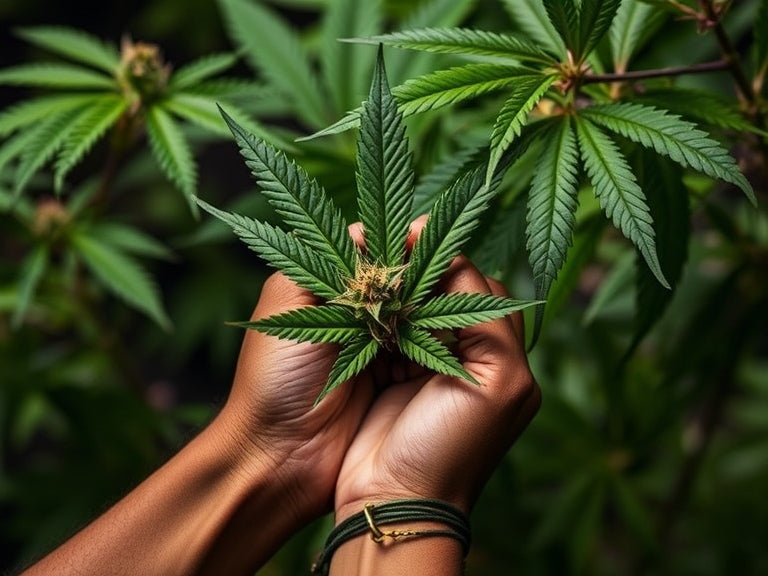
How Cannabis Can Play a Role in Social Justice and Equity
by Dexter Cann
·
Cannabis has long been a contentious subject, weaving its way through legal, cultural, and social landscapes. Once stigmatized and heavily policed, cannabis is now emerging as a symbol of change, with legalization efforts shining a spotlight on its potential to contribute to social justice and equity. The journey from prohibition to acceptance is more than just a legal battle; it's a chance to address systemic inequities and create opportunities for those disproportionately affected by the war on drugs.
In this blog, we’ll explore the intersections of cannabis, social justice, and equity—delving into the historical context, current initiatives, and ways consumers and businesses can drive meaningful change.
Understanding the History: Cannabis and Inequity
The War on Drugs and Its Legacy
The criminalization of cannabis in the United States is deeply rooted in racial and social inequities. Policies like the Controlled Substances Act of 1970 and the "War on Drugs" disproportionately targeted Black and Brown communities, leading to mass incarceration and generational economic setbacks. Despite similar usage rates, people of color have historically been arrested and convicted for cannabis-related offenses at rates far exceeding those of their white counterparts.
Economic Disparities
These disparities didn’t end with incarceration. Families and communities affected by cannabis-related convictions often face long-term consequences, including restricted access to housing, employment, and education opportunities. This systemic inequity underscores the need for restorative efforts within the burgeoning cannabis industry.
Cannabis Legalization: A Double-Edged Sword
Opportunities in Legalization
Legalization has opened doors to a multibillion-dollar industry, creating jobs, generating tax revenue, and reducing some of the stigma surrounding cannabis. Many states have also implemented expungement programs to clear prior cannabis-related convictions, allowing individuals to reclaim their lives.
Barriers to Entry
However, the benefits of legalization are not equally distributed. The costs of entering the cannabis market—licensing fees, regulatory compliance, and capital investments—often exclude small business owners, particularly those from marginalized communities. Additionally, large corporations dominate the market, overshadowing social equity initiatives.
Social Equity Programs: A Step Toward Justice
What Are Social Equity Programs?
Social equity programs aim to level the playing field by prioritizing communities disproportionately impacted by cannabis prohibition. These programs provide resources such as reduced licensing fees, technical assistance, and access to funding.
Success Stories
Cities like Oakland and Los Angeles have pioneered social equity programs, offering licenses to individuals with prior cannabis convictions or those from affected neighborhoods. While these programs are not without challenges, they represent an important step toward inclusivity in the cannabis industry.
Areas for Improvement
To ensure these programs succeed, governments and private entities must address systemic barriers like access to capital, business mentorship, and long-term support. Collaboration between the public and private sectors is crucial to creating a truly equitable market.
Advocacy and Community Action
Grassroots Movements
Advocacy groups like the Drug Policy Alliance and Last Prisoner Project work tirelessly to address the lingering effects of cannabis prohibition. By supporting these organizations, individuals can contribute to broader social justice efforts.
Consumer Responsibility
As consumers, we wield significant power. Supporting brands that prioritize social equity and community reinvestment sends a strong message. Look for companies that:
-
Partner with social equity programs.
-
Employ individuals from impacted communities.
-
Donate a portion of their profits to advocacy efforts.
Business Accountability
Cannabis businesses have a unique opportunity to lead by example. This means going beyond compliance to actively foster diversity, equity, and inclusion within their operations and supply chains. Brands that champion these values set a precedent for the industry as a whole.
Cannabis and Restorative Justice
Addressing Past Harms
Restorative justice involves acknowledging and addressing the harms caused by cannabis prohibition. This can take many forms, such as:
-
Expunging criminal records for non-violent cannabis offenses.
-
Investing in community programs, including education, housing, and healthcare.
-
Providing reparative job opportunities to individuals affected by the war on drugs.
Education and Awareness
Promoting awareness about the social justice implications of cannabis is key to driving change. Businesses, policymakers, and consumers all play a role in shifting the narrative from punishment to progress.
The Role of Sustainable Practices
Environmental Impact
Social justice in cannabis isn’t just about people; it’s also about the planet. Sustainable cultivation and packaging practices can reduce the environmental footprint of the cannabis industry, ensuring that progress doesn’t come at the cost of ecological harm.
Community Reinvestment
Some cannabis companies are leading the way by reinvesting a portion of their profits into local communities. This includes funding scholarships, supporting small businesses, and contributing to public health initiatives.
The cannabis industry stands at a crossroads, with the power to either perpetuate existing inequities or become a force for social good. As consumers and advocates, our choices matter. By supporting equitable practices and businesses committed to making a difference, we can help shape a future where cannabis is not just a product but a tool for justice.
Explore Cubbi’s thoughtfully designed stash boxes today and take a step toward responsible cannabis consumption. Together, we can create a more equitable and sustainable future. Shop Now